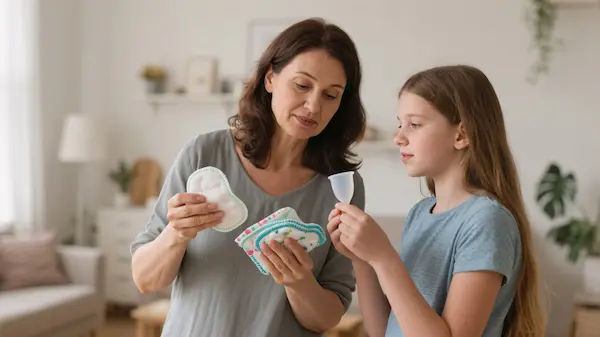Guide to Menstrual Health And Hygiene
A comprehensive guide to menstrual health and hygiene for men. Learn about the basics of menstruation, how to support the women in your life, and the importance of breaking the stigma around periods.

Written by Dr. M L Ezhilarasan
Reviewed by Dr. Rohinipriyanka Pondugula MBBS
Last updated on 13th Jan, 2026

Introduction
Your period is a natural, biological process experienced by half the world's population, yet it's often shrouded in silence and stigma. Navigating menstrual health and hygiene can feel overwhelming, especially with so much information and misinformation available. But understanding your body is the first step toward empowerment and wellbeing. This comprehensive guide is designed to demystify your cycle, offering practical, evidence-based advice on everything from choosing the right products to managing symptoms and knowing when to seek professional care. We'll move beyond basic hygiene to explore how you can truly thrive throughout your menstrual cycle, embracing it as a vital sign of your overall health.
Why Menstrual Health is More Than Just Hygiene?
While keeping clean is crucial, menstrual health encompasses a much broader spectrum. It's about your physical, mental, and social wellbeing in relation to your menstrual cycle. It means having access to accurate information, safe products, and supportive environments. Good menstrual hygiene—the practice of using clean materials to absorb blood and bathing regularly—is a critical component that prevents infections and ensures comfort. However, true menstrual health also involves understanding your hormonal fluctuations, managing energy levels, and recognizing your cycle as a key indicator of your health. Neglecting this aspect can lead to more than just discomfort; it can mask underlying conditions like PCOS or endometriosis.
Unique Insight: Think of your period not as an inconvenience, but as a monthly health report. The color, consistency, and flow of your blood, along with the symptoms you experience, can provide valuable clues about your nutritional status, stress levels, and hormonal balance. Paying attention to these details is a form of proactive selfcare.
Building Your Menstrual Toolkit: A Guide to Products
Choosing the right products is fundamental to comfort and confidence. The best choice is highly personal and depends on your flow, lifestyle, and values.
Disposable Options: Pads and Tampons
Disposable pads are a popular starting point for many. They are easy to use, readily available, and involve no internal insertion. When choosing the right pad, consider your flow (light, regular, heavy, overnight), wing design for security, and material (cotton tops are often better for sensitive skin). Tampons, worn internally, offer freedom for activities like swimming. The key to using tampons safely is to choose the lowest absorbency for your flow and change them every 48 hours to minimize the risk of Toxic Shock Syndrome (TSS), a rare but serious bacterial infection.
Consult Top Specialists
Reusable and Sustainable Choices
For those looking to reduce waste and long term costs, reusable options are excellent. Menstrual cups, made from medical grade silicone or rubber, are inserted to collect blood. They can be worn for up to 12 hours, hold more than a super tampon, and are a fantastic sustainable period product. Period panties look and feel like regular underwear but have builtin, absorbent layers that can hold up to two tampons' worth of fluid. They are perfect for light flow days, as backup, or even overnight for those with a lighter flow.
Essential Hygiene Practices During Your Period
Proper hygiene is nonnegotiable for preventing irritation and infection.
How Often Should You Change Your Product?
A good rule of thumb is to change your pad every 46 hours and your tampon every 48 hours. Menstrual cups can be emptied every 812 hours. For those with a heavy menstrual bleeding, changes will need to be more frequent. Stagnant blood can create an environment for bacteria to grow and lead to odor or infections.
Proper Cleaning and Washing Techniques
Wash your hands thoroughly before and after handling any menstrual product. When bathing, clean the external vaginal area (the vulva) with warm water and a mild, unscented soap. Avoid douches or scented sprays, as they disrupt the natural pH balance, leading to infections. For reusable products like cups, sterilize them in boiling water between cycles.
Managing Common Period Symptoms Naturally
It's common to experience cramps, bloating, and mood changes. Here’s how to find PMS symptoms relief naturally.
Easing Menstrual Cramps at Home
Heat is a proven remedy. Apply a heating pad or hot water bottle to your lower abdomen to relax the contracting muscles. Light exercise, like walking or yoga, increases blood flow and releases endorphins, the body's natural painkillers. Over-the-counter antiinflammatory drugs like ibuprofen can also be highly effective if taken at the first sign of cramps.
Diet and Nutrition for a Happier Cycle
What you eat can significantly impact your symptoms. Reduce salt to combat bloating, cut back on caffeine and sugar to stabilize mood swings, and increase your intake of magnesium-rich foods (like dark leafy greens and nuts) and omega3 fatty acids (found in fish and flaxseeds), which have antiinflammatory properties that can help ease menstrual cramps.
Beyond the Basics: Recognizing When to Seek Help
Your period shouldn't debilitate you. It's important to know the signs that indicate a deeper issue.
Symptoms That Warrant a Doctor's Visit
Consult a healthcare professional if you experience:
Periods so heavy you need to change your product every hour.
Severe pain that isn't relieved by over-the-counter medication.
Bleeding that lasts longer than seven days.
Bleeding between periods or after sex.
You suspect you might have Toxic Shock Syndrome symptoms (sudden high fever, dizziness, rash, muscle aches).
If your periods are consistently disrupting your life, it’s crucial to consult a doctor. You can easily book a physical visit to a gynecologist with Apollo24|7 to discuss your symptoms and get a personalized evaluation.
Custom Image Concepts
1. Image 1: "The Menstrual Product Spectrum" Infographic
Visual: A horizontal, comparative chart with icons and short descriptions of pads, tampons, cups, discs, and period panties. Include pros (e.g., "easy to use," "sustainable") and cons (e.g., "may contain chemicals," "learning curve") for each.
Alt Text: Comparative infographic on types of menstrual products like pads, tampons, and cups for better menstrual hygiene.
2. Image 2: "Cycle Syncing for Wellness" Diagram
Visual: A circular diagram divided into four phases (Menstrual, Follicular, Ovulatory, Luteal). For each phase, include simple icons for recommended food (e.g., ironrich meat for menstrual phase), exercise type (e.g., yoga vs. HIIT), and overall energy level.
Alt Text: Diagram on menstrual cycle phases and how to sync diet and exercise for optimal health and hygiene.
3. Image 3: "When to See a Doctor" Flowchart
Visual: A simple decision tree. Start with "Experiencing period problems?" > "Is pain severe and unmanageable?" (Yes > See Doctor) > "Is bleeding excessively heavy?" (Yes > See Doctor) > "Are cycles highly irregular?" (Yes > See Doctor) > (No) > "Try natural management techniques."
Alt Text: Flowchart to help decide when to see a doctor for menstrual health issues and abnormal period symptoms.
Quick Takeaways
Menstrual health is a vital sign of your overall wellbeing, not just about hygiene.
Change your pad/tampon every 46 hours to prevent infections.
For natural remedies for period cramps, use heat therapy and light exercise.
Track your cycle to understand your unique patterns and identify irregularities.
Consider sustainable period products like cups or period panties for ecofriendliness.
Severe pain, very heavy bleeding, and irregular cycles are signs to consult a doctor.
Always wash your hands before and after handling any menstrual product.
Conclusion
Understanding and managing your menstrual health and hygiene is a powerful form of selfcare. It’s about finding what makes you feel comfortable, confident, and in tune with your body. From selecting the right products from your menstrual toolkit to adopting healthy habits that ease symptoms, every small step contributes to your overall wellbeing. Remember, your period is a natural part of life, and there should be no shame or stigma in discussing it or seeking help when needed. By educating ourselves and others, we can break down taboos and create a world where everyone can manage their period with dignity and grace. Start paying attention to your cycle today—it has a lot to tell you about your health.
Consult Top Specialists
Consult Top Specialists

Dr. Chethan T L
General Physician/ Internal Medicine Specialist
5 Years • MBBS, MD, DNB (General Medicine)
Bengaluru
Apollo Medical Center, Marathahalli, Bengaluru

Dr. Pankaj Dubey
General Physician/ Internal Medicine Specialist
28 Years • MBBS,Dip.Card, MRCP., FJFICM
Ahmedabad
Apollo Hospitals Gandhinagar, Ahmedabad

Dr. Tanmaya Kumar Sahu
General Physician/ Internal Medicine Specialist
12 Years • MBBS, MD ( Internal Medicine )
Bhubaneswar
Apollo Hospitals Old Sainik School Road, Bhubaneswar
(25+ Patients)

Dr Venkat Nani Kumar B
General Physician/ Internal Medicine Specialist
9 Years • MBBS, MD,(Internal Medicine)
Hyderabad
Apollo Hospitals Jubilee Hills, Hyderabad
(75+ Patients)

Dr. Swaroopa Rani
General Physician/ Internal Medicine Specialist
9 Years • MBBS, MD (Internal Medicine)
Bengaluru
Apollo Medical Center, Marathahalli, Bengaluru


.webp)